Gove claims Sinn Féin's results could help restore Stormont
- Published
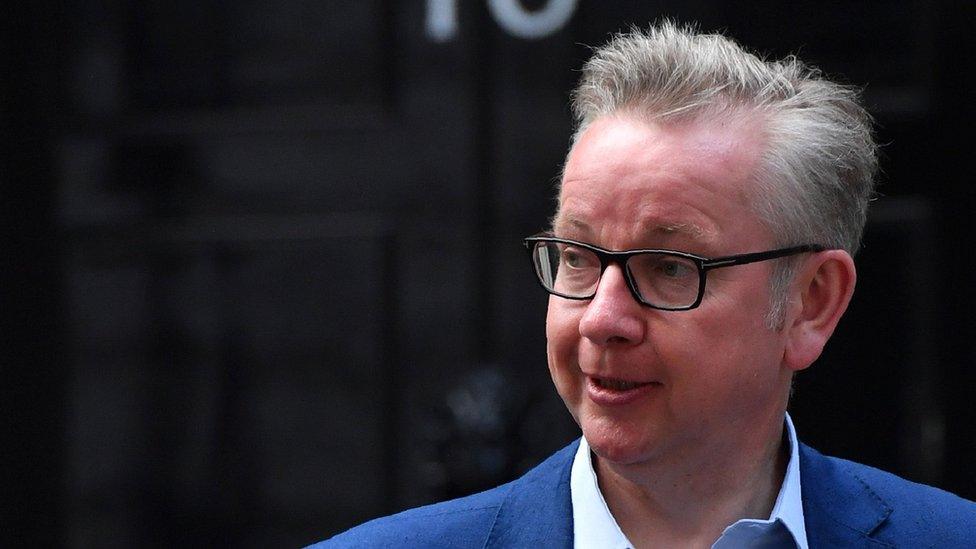
One of the contenders in the race to be the next prime minister has claimed Sinn Féin's poor election results in Ireland might have a positive impact on the Stormont talks.
The Environment Secretary Michael Gove told the Spectator magazine Irish voters did not like the party's refusal to re-engage with power sharing.
Sinn Féin rejected Mr Gove's analysis.
They argued that the Conservative's deal with the DUP remains a major cause of the continuing deadlock.
On Tuesday Sinn Féin conceded defeat after demanding a recount in the Ireland South European constituency.
The loss of two MEPs and half its southern councillors has proved a blow for the party - and their opponents have been rubbing it in.
Allow X content?
This article contains content provided by X. We ask for your permission before anything is loaded, as they may be using cookies and other technologies. You may want to read X’s cookie policy, external and privacy policy, external before accepting. To view this content choose ‘accept and continue’.
The Irish Justice Minister Charlie Flanagan tweeted "Vote Sinn Féin in Ireland; They refuse to enter Govt. Vote Sinn Féin in Northern Ireland; they refuse to enter Stormont.
"Vote Sinn Fein for Westminster; They refuse to go there too. Why vote Sinn Fein at all ?....."
Mr Gove told an event in London that Sinn Féin's "bad time" in the recent Irish elections was in part because "voters there did not like the approach towards devolution in Northern Ireland and the refusal to re-engage".
He told his audience this represented a "significant change" which might provide an "opportunity to get the parties back around the table to get a negotiated settlement so that we restore devolution".
Difficult Irish campaigns
In the wake of the recent elections, some questioned Mary Lou McDonald's leadership.
Since taking over from Gerry Adams, Ms McDonald has presided over difficult campaigns for the Irish Presidential, council and European elections.
In Northern Ireland, the party's vote was more stable, but it did not make some of the advances it had hoped for in last month's council elections.
However, Ms McDonald is not giving any credence to the analysis of a would-be prime minister.
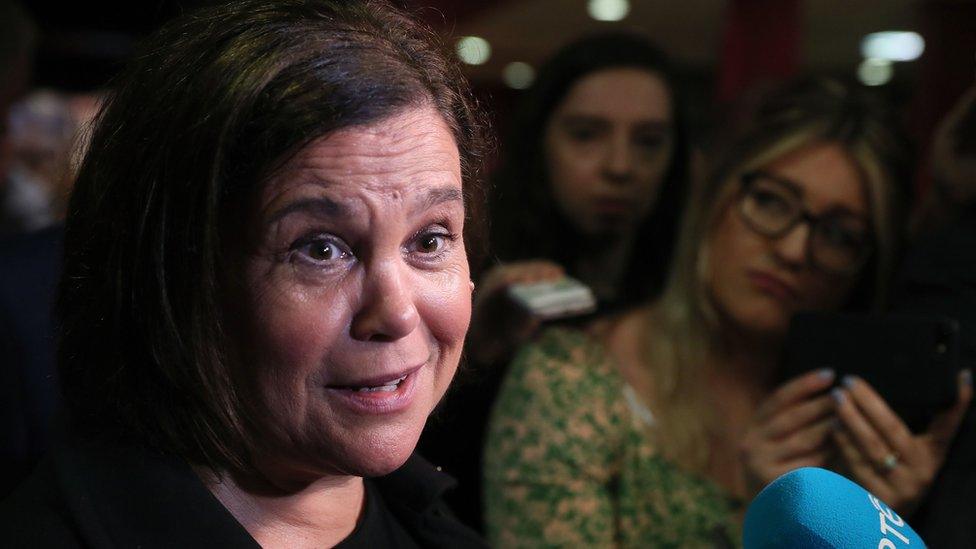
Mary Lou McDonald
After another Stormont talks session, she told BBC Northern Ireland: "I don't know if Michael Gove is an expert on politics in Ireland.
"He certainly doesn't follow it very carefully if he doesn't realise that we have always moved to engage.
"We have made very clear that the current stalemate is totally unacceptable, and this stalemate has been driven in no small part by the relationship between the Tories and the DUP.
"It has also been driven by Brexit and all the uncertainty and jeopardy that presents."
Promising political backdrop?
The mood inside the Stormont talks has been described as positive, but Sinn Féin says there needs to be a "radical step change" away from "discussion and generality and into real negotiation".
But a departing prime minister and an impending Brexit does not provide a promising political backdrop.
In that context, it is hard to see why Sinn Féin should settle for any less or the DUP offer any more than the two parties did at the time of their last failed deal in February 2018.
Last week pupils from a number of Irish language schools demonstrated outside the Assembly building in support of an Irish Language Act.
That was one of the key issues which scuppered last year's negotiations.
Ciarán Mac Giolla Bhéin from the campaign group Conradh na Gaeilge does not see why Sinn Féin should soften its previous red lines.
He points out that during the 10 years since the St Andrews Agreement there have been three consultations on the proposed legislation.
"There was clear demonstrable support for an Irish Language Act, but at every single juncture it was brought to the table it was rejected. Nothing has convinced us that will change in any future Assembly unless it is agreed now in the negotiations," he said.
Renegotiating red lines?
It is simplistic to try to explain the outcome of the recent elections purely in relation to the Stormont deadlock.
The results reflected the changing fortunes of the Irish economy, attitudes to Brexit and an increasing anxiety about climate change.
Former Sinn Féin MLA Daithí McKay does not think the party will rub out any of their negotiating red lines.
However, he thinks the party needs to reflect on the fact that "people are looking beyond the red lines".
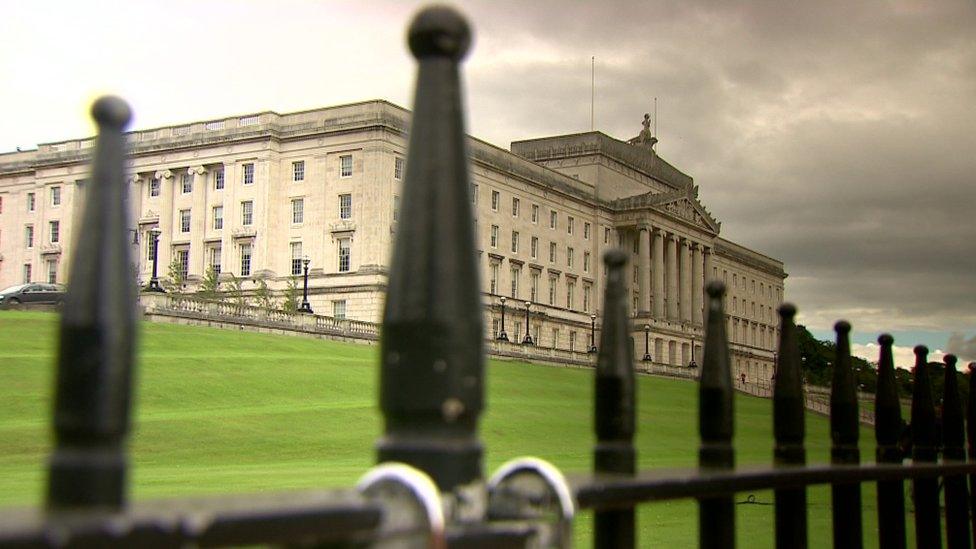
NI has been without a devolved government since January 2017, when the DUP and Sinn Féin split in a bitter row
"They do want to see rights dealt with, but they also want to see a sustainable Assembly and to have that you need to look at radical changes, such as to the cross community petition of concern".
Mr McKay also thinks Sinn Féin will examine the recent "Green wave" and ensure that "environmental issues are more to the forefront of their message than they have been in the past".
There is no doubt the recent elections have given Sinn Féin food for thought.
But the party's core vote in Northern Ireland remained relatively stable and republican strategists will not want to do anything to jeopardise that.
Nor will they want to be seen as taking any advice from either Charlie Flanagan or Michael Gove.
- Published4 June 2019
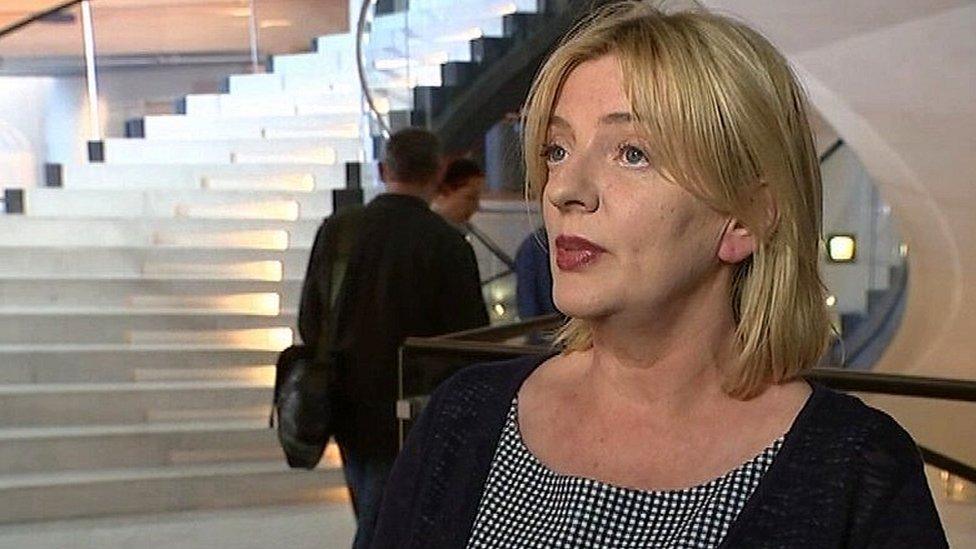
- Published3 June 2019
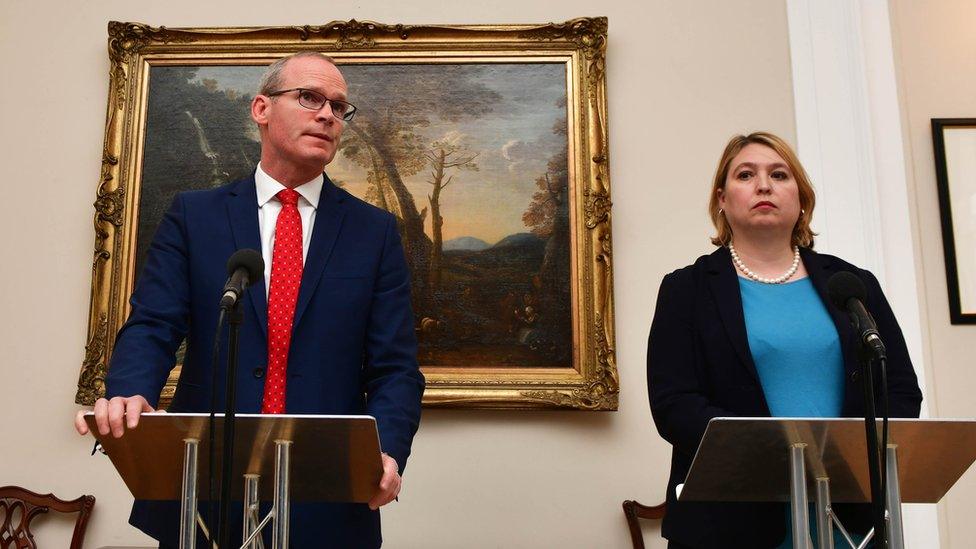
- Published27 June 2017